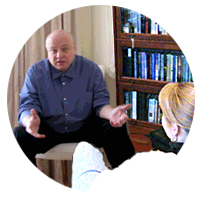
Common wisdom suggests that stress in our lives is caused by our overwhelming modern lifestyle. We are taught to reduce the harmful effects of stress by simplifying our lives and acquiring coping and relaxation skills such as cognitive reframing, workouts, and deep breathing exercises.
In my experience, however, a vast majority of stress comes from interpersonal relationship issues caused by miscommunication, unmanaged expectations, and distractive defense mechanisms, and the best remedy for stress is a satisfying close relationship.
Some people are naturally more predisposed to anxiety than others, depending on their life experiences and personality traits. Even though we cannot change those traits, we can teach our clients to feel more prepared for the unknown.
Unstable and volatile relationships are a major cause of anxiety. Medications can help with the symptoms, but improving the mutual understanding and intimacy in your relationship will address the root of the problem.
When the colors of the world are reduced to shades of grey, when any effort feels insurmountable, when it seems like nothing good could ever happen to you and there is no reason to get out of bed - then you know you are depressed. There are many factors that can cause depression, but when depression starts, it should be treated regardless of the cause. No need to explain that "I am just really going through a rough time."
Yet the cause of depression does matter. If the depression is caused by a stressful relationship, it will be back in no time, no matter how well it is treated. Working on improving the relationship is as important as psychotherapy or antidepressants.
We all know that anger is bad, creates problems, and destroys relationships. We need to learn to control our anger, to let off steam, to breathe and to count to ten.
In reality, anger is a healthy and necessary feeling, akin to pain: it signals that there is a threat that requires a reaction. It urges us to send a message that would prevent us from being harmed. Aggression is just one of the ways to send this message. Learning alternative ways of expression can make aggression unnecessary.
Similarly, you can learn how to deal with someone else's anger. Knowing how to acknowledge adequately that you received and understood the angry message can make the an apology work and turn an angry beast into a loving companion.
Not all relationships are worth salvaging, whether they are with a romantic partner, a spouse, a parent, a child, or a close friend. Knowing how to end the relationship properly can make the difference between hope and misery.
It's never easy to break up. Many people stay together out of habit, fear of loneliness, financial and emotional interdependence, "for the sake of children," and fear of hurting the other person's feelings, despite the toxic and abrasive nature of their relationship. All those factors should be weighed when making the decision whether to stay together or part ways. Being deeply emotionally involved makes it especially hard to sort things out. In this situation, talking to a counselor is indispensable.
Breaking up does not necessarily mean eliminating another person from your life, and often it is unavoidable to maintain a different type of relationship, especially if children are involved. The way in which a relationship is closed defines whether the former partners will fight for the rest of their lives or build a functioning and peaceful partnership.
A prominent Russian mathematician, whose daughter happened to be my high school classmate, once claimed that he had come up with a formula for happiness. It looked like this:
happiness=p·(p+w)
where p represents satisfaction in personal relationships, and w represents satisfaction in work. From the formula, it follows that if you are not satisfied with your work, you may still be happy, but if your relationships fail, there is no hope.
Every day, I see people who want to be together but cannot find a way to avoid anger, guilt, resentment, lack of trust, and emotional rollercoasters. Typically, these feelings are caused by an inability to communicate, to avoid baseless assumptions, to manage each other's expectations, to recognize and express emotions, and to keep appropriate personal boundaries. I am not necessarily talking only about the relationships with a romantic partner or a spouse: it could be a friend, a mother, a father, or another close family member.
Relationships are based on skills that can be learned. All you need is a good teacher!

71 Franklin Turnpike, Suite 1-2, Waldwick, NJ 07463
(201) 497-0289 ♦ therapy@fradkov.com ♦ FAX (866) 850-6432
© 2006-2024 Valéry Fradkov | Based on design by Andreas Viklund

